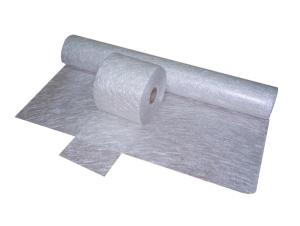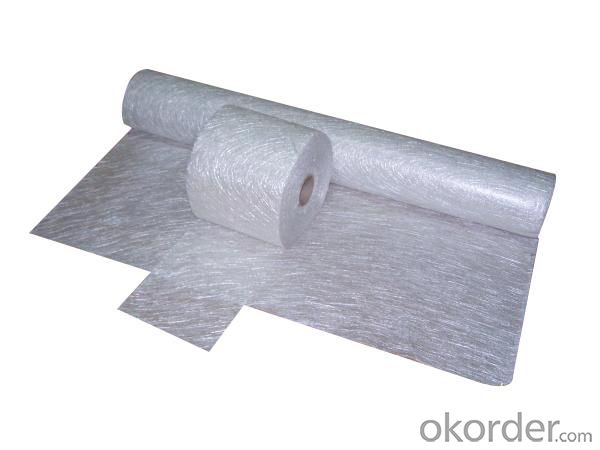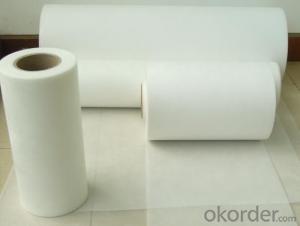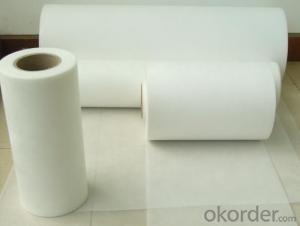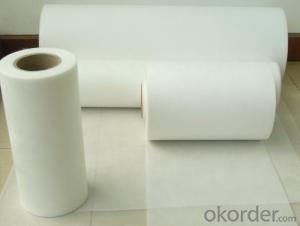Fiberglass Mat Tissue C-Glass CSM
- Loading Port:
- China Main Port
- Payment Terms:
- TT or LC
- Min Order Qty:
- 5Ton kg
- Supply Capability:
- 600TON PER MONTH kg/month
OKorder Service Pledge
OKorder Financial Service
You Might Also Like
Feature of C-glass CSM
high dry ,wet tensile strength ,good transparency
Appliction of C-glass CSM
various panels, boats, bath equipment automotive parts
we are one of the professional factory who can manufacture chopped strand mat well in China.
Fiberglass Chopped Strand Mat is an unwoven fabric consisting of randomly distributed chopped strands held together with a powder or emulsion binder.
Chopped Strand Mat is compatible with unsaturated polyester, vinyl ester, epoxy and phenolic resins. This specification is most widely used in hand lay-up process and can also be used in filament winding, Compression molding and continuous laminating processes. The typical end-use applications include various panels, Tank, boat,stailgate of a truck ,etc
Specification of C-glass CSM
General Data:
Product Code: EMC,CMC
Glass type: E-glass,C-GLASS
Bond type: Powder binder or Emulsion binder
Desity: 100g/m2~ 900g/m2.
Roll Width: 200-3200mm usually is 1040mm/1250mm/1270mm
package of C-glass CSM
polythelene bag+carton+pallet+Stretch wrap film
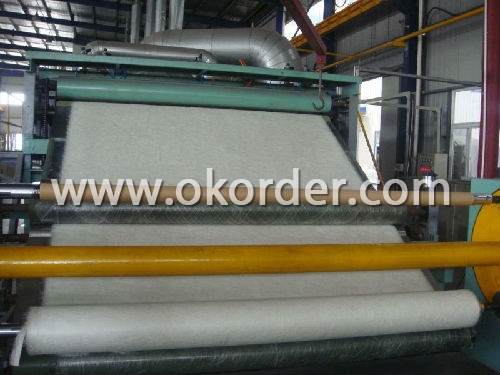
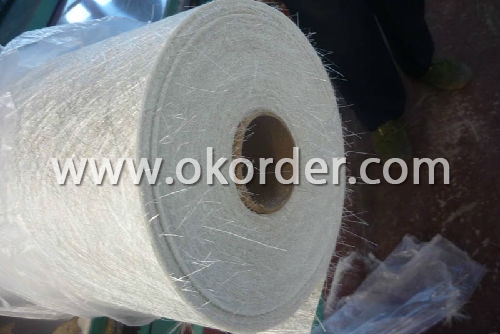
- Q: Is fiberglass mat tissue easy to install?
- Yes, fiberglass mat tissue is relatively easy to install. It is lightweight and flexible, making it convenient to handle and work with. Additionally, it can be easily cut to the desired size and shape, allowing for precise installation in various applications.
- Q: Can fiberglass mat tissue be used for ceiling insulation?
- No, fiberglass mat tissue is not typically used for ceiling insulation. It is a material commonly used in the construction of composite materials, reinforcing plastic products, and for soundproofing purposes. Ceiling insulation is typically done using materials specifically designed for thermal and acoustic insulation, such as fiberglass batts, cellulose, or foam insulation boards.
- Q: What are the applications of fiberglass mat tissue?
- Fiberglass mat tissue is a versatile material that finds numerous applications across various industries. Some of the key applications of fiberglass mat tissue are: 1. Construction and Building Materials: Fiberglass mat tissue is widely used in the construction industry as a reinforcement material. It is commonly used in the manufacturing of roofing shingles, insulation materials, and wall coverings. The strong and durable nature of fiberglass mat tissue enhances the structural integrity of buildings and improves their resistance to external elements such as wind, moisture, and temperature changes. 2. Automotive Industry: Fiberglass mat tissue is extensively used in the automotive sector for manufacturing various components such as door panels, headliners, trunk liners, and interior trim parts. The lightweight and high strength properties of fiberglass mat tissue make it an ideal material for reducing the overall weight of vehicles while maintaining their structural integrity. 3. Marine Industry: Fiberglass mat tissue is widely used in the marine industry for the production of boat hulls, decks, and other structural components. The corrosion-resistant nature of fiberglass mat tissue makes it suitable for marine applications where exposure to water and harsh weather conditions is common. 4. Pipe Manufacturing: Fiberglass mat tissue is used in the production of fiberglass reinforced pipes. These pipes find applications in various industries such as oil and gas, chemical, and water management. The high strength and corrosion-resistant properties of fiberglass mat tissue make it an excellent choice for manufacturing pipes that can withstand high pressure and harsh chemical environments. 5. Filtration Systems: Fiberglass mat tissue is used in the production of air filters and liquid filtration systems. The fibrous structure of the material allows for efficient filtration by trapping dust particles, dirt, and other contaminants. This makes fiberglass mat tissue a preferred choice for applications requiring high-efficiency filtration, such as HVAC systems, industrial air filters, and water treatment plants. Overall, the applications of fiberglass mat tissue are vast and diverse, ranging from construction and automotive industries to marine and filtration systems. Its unique properties make it an invaluable material for enhancing structural integrity, reducing weight, and improving performance across various sectors.
- Q: Can fiberglass mat tissue be used for making surfboards?
- Surfboards can indeed be made using fiberglass mat tissue. This material, known for its lightweight yet robust properties, is commonly utilized in constructing surfboards. Typically, it is combined with epoxy resin to form a sturdy and durable surface. By incorporating fiberglass mat tissue, surfboards gain the strength and flexibility necessary to endure the demanding conditions encountered while riding waves. Moreover, the smooth and sleek texture of the material enhances the surfboard's performance and speed. In summary, fiberglass mat tissue is a favored option for constructing high-performance surfboards due to its exceptional strength-to-weight ratio.
- Q: How does fiberglass mat tissue perform in terms of thermal resistance?
- Fiberglass mat tissue performs exceptionally well in terms of thermal resistance. Due to the inherent properties of fiberglass, such as low thermal conductivity and high melting point, the mat tissue effectively acts as a barrier against heat transfer. It efficiently blocks the conduction of heat, limiting thermal energy from passing through the material. This makes fiberglass mat tissue an excellent choice for insulation applications where thermal resistance is crucial, such as in buildings, industrial equipment, and automotive components. Additionally, fiberglass mat tissue is known for its fire-resistant properties, further enhancing its ability to withstand high temperatures and provide excellent thermal insulation.
- Q: Can fiberglass mat tissue be used for insulating refrigeration units?
- Fiberglass mat tissue is indeed suitable for insulating refrigeration units due to its lightweight nature and outstanding thermal insulation properties. It finds extensive use in a wide range of applications where insulation is necessary, including refrigeration units. By minimizing heat transfer, the fiberglass mat tissue ensures that the internal temperature of the refrigeration unit remains stable, safeguarding the stored items from any external heat. Moreover, its moisture-resistant capabilities are particularly crucial in refrigeration units as they prevent condensation and help maintain the cooling system's efficiency. All in all, fiberglass mat tissue proves to be a reliable and effective option for insulating refrigeration units.
- Q: Can fiberglass mat tissue be used for repairing fiberglass fenders?
- Fiberglass fenders can be repaired using fiberglass mat tissue. This versatile material is commonly employed in fiberglass repair tasks, serving as a reinforcement layer to enhance strength and durability in the repaired region. To mend damaged or cracked areas of fiberglass fenders, one can apply a resin layer and then lay the fiberglass mat tissue on top. By saturating the mat tissue with additional resin, a strong bond is formed, ensuring a smooth finish. This restorative process not only revitalizes the fender's structural integrity but also delivers a seamless repair. It is worth noting, however, that the extent of the damage and the expertise of the repairer ultimately determine the success of the repair.
- Q: What is the chemical resistance of fiberglass mat tissue?
- Fiberglass mat tissue exhibits excellent chemical resistance due to the inherent properties of the fiberglass material. The mat tissue is typically composed of glass fibers that are woven or bound together, providing a barrier against a wide range of chemicals. The glass fibers themselves are highly resistant to corrosion, making fiberglass mat tissue suitable for use in environments where exposure to chemicals is a concern. The chemical resistance of fiberglass mat tissue can vary depending on the specific resin or binder used in the manufacturing process. Different types of resins may provide enhanced resistance to certain chemicals, while others may be more susceptible to degradation. It is important to consider the specific chemicals that will come into contact with the fiberglass mat tissue and select a resin or binder that is compatible with those substances. In general, fiberglass mat tissue is known for its resistance to acids, alkalis, solvents, and many other chemicals commonly found in industrial and commercial settings. It can withstand exposure to a wide range of corrosive substances, making it a versatile and durable material for various applications. However, it is worth noting that prolonged exposure to highly concentrated or aggressive chemicals may eventually cause some degradation or deterioration of the fiberglass mat tissue. Therefore, it is essential to consult the manufacturer's specifications and guidelines to ensure proper chemical compatibility and performance in specific environments.
- Q: Does fiberglass mat tissue provide any electrical insulation?
- Indeed, electrical insulation is provided by fiberglass mat tissue. Fiberglass, as a material, is non-conductive, signifying its incapability to conduct electricity. Once utilized as a mat tissue, it serves as a protective obstacle, effectively obstructing the passage of electrical current through the material. Consequently, it becomes fitting for a wide range of electrical applications necessitating insulation, including the production of circuit boards, electrical panels, and insulating tapes. Furthermore, fiberglass mat tissue is recognized for its exceptional dielectric strength, thereby augmenting its electrical insulation attributes.
- Q: Is fiberglass mat tissue resistant to mildew and rot?
- Indeed, the resistance of fiberglass mat tissue to mildew and rot is undeniable. Crafted from delicate glass fibers interlaced to form a robust and enduring substance, fiberglass stands as a paragon. Its non-porous nature prevents moisture absorption, thus endowing fiberglass mat tissue with exceptional resistance against mildew proliferation and rot-induced decomposition. Moreover, fiberglass often receives protective coatings or additives that amplify its fortitude against these biological detriments. For this reason, fiberglass mat tissue emerges as an exemplary selection in settings where humidity or moisture pose a threat, such as bathrooms, outdoor structures, or regions prone to elevated humidity levels.
1. Manufacturer Overview
| Location | Zhejiang, China |
| Year Established | 1969 |
| Annual Output Value | Above US$ 150 Million |
| Main Markets | overseas companies in Hongkong, Canada, South Africa, South Korea, India, Italy, Singapore, France and many other countries and regions. |
| Company Certifications | ISO9001;ISO14001 |
2. Manufacturer Certificates
| a) Certification Name | |
| Range | |
| Reference | |
| Validity Period |
3. Manufacturer Capability
| a) Trade Capacity | |
| Nearest Port | Shanghai |
| Export Percentage | 40%-50% |
| No.of Employees in Trade Department | 21-50 People |
| Language Spoken: | English |
| b) Factory Information | |
| Factory Size: | Above 5000,000 square meters |
| No. of Production Lines | Above 5 |
| Contract Manufacturing | |
| Product Price Range | Average |
Send your message to us
Fiberglass Mat Tissue C-Glass CSM
- Loading Port:
- China Main Port
- Payment Terms:
- TT or LC
- Min Order Qty:
- 5Ton kg
- Supply Capability:
- 600TON PER MONTH kg/month
OKorder Service Pledge
OKorder Financial Service
Similar products
Hot products
Hot Searches
Related keywords
